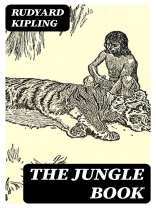Rudyard Kipling’s 'The Jungle Book’ is a seminal collection of short stories first published in 1894, which intricately weaves the themes of nature, survival, and moral growth through the experiences of a human boy raised by wolves in the Indian jungle. Kipling’s narrative style is marked by a rich, evocative language that brings to life the vivid landscapes and diverse animal characters, offering readers both enchanting tales and profound allegories that explore the duality of civilization and the wild. Situated within the broader context of colonial literature, the work reflects Victorian attitudes towards both the natural world and the complexities of cultural identity, articulating a deep engagement with the British Raj in India and its sociopolitical implications. Kipling, born in British India, was profoundly influenced by his formative years in the subcontinent, which shaped his understanding of its culture, landscapes, and wildlife. Drawing on his personal experiences and observations, he crafted a world where human and animal lives intersect with themes of loyalty, friendship, and the struggle for one’s identity. His unique perspective as an expatriate gives 'The Jungle Book’ its distinctive flavor, merging Western storytelling with Eastern settings and themes. This classic text invites readers of all ages to delve into the multifaceted relationship between humanity and the animal kingdom. With its rich narrative, moral lessons, and exploration of the jungle as a metaphor for the trials of life, 'The Jungle Book’ is not only a tale of adventure but also a timeless reflection on the essence of belonging. It is an essential read for those seeking wisdom in storytelling and an appreciation for the interconnectedness of all beings.
O autorze
Rudyard Kipling, born on December 30, 1865, in Bombay, British India, was an English journalist, short-story writer, poet, and novelist. He is perhaps best known for his works of fiction, including 'The Jungle Book’ (1894), a collection of stories that has captivated readers with its tales of Mowgli, a boy raised by wolves in the Indian jungle. Kipling’s literary style is characterized by his use of rhythm and his embrace of the supernatural, which often served as a metaphor for the complexity of existence and the colonial experience. His stories combine his deep knowledge of Indian culture and life with his insights into the British Empire’s governance. Kipling was esteemed for his storytelling prowess, which was evident in the way he juxtaposed the jungle’s raw, untamed nature against the narratives of civilization and order. The Jungle Book was followed by 'The Second Jungle Book’ in 1895, further cementing Kipling’s legacy as a master storyteller. He was awarded the Nobel Prize for Literature in 1907, a testament to his influence and achievement in the literary world. Kipling’s works remain widely read and have been adapted into numerous formats, reflecting the timeless nature of his storytelling and the deep human truths contained within his tales.












